英语口语习惯用语:here and now
英语表达中——习惯
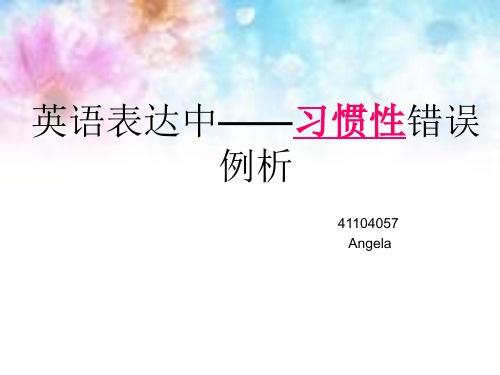
“下雨”和“下雪”可有weather作 主语吗
• 1. __________ is cold here. • 2. __________ is going to rain. • A. It,That B. Ther weather,Ther weather • C. That,That D. The weather,It • 此题应选D。容易误选B。按照英语的表达 习惯:表示“下雨”、“下雪”等自然现 象时,一般用 it 作主语,而不能用 the weather。
cigarette作为可数名词,其前的冠词在此情况下不宜省去。
错选B,主要是因为受中文“请”字的影响。 在用祈使句表示“提供”时,到底 please该不该用呢?
《朗是这样说的:Note also that, unlike in some other languages, "please“ is not used in English when offering things to people or when replying to thanks. (还要注意,与某些其他语言不同,在给人提 供某物或回答感谢时,英语不用please)。
人们认为以名相称是关系密切彼此友好的表现所以他们不仅兄弟姐妹之间或同事朋友之间直接以名相称而且师生之间包括老师对学生和学生对老师也可以名相称同样对长辈有时也可对名相称如某人的叔叔叫johnsmith他可称他为uncleunclejohn接称他为johnplease若把请抽烟译成英语应该是下面的哪一句
• • • • • • • • • • • • • •
要下雨了。 正:It’s going to rain. 误:The weather is going to rain. 昨夜下了雪。 正:It snowed last night. 误:The weather snowed last night. 但是若表示天气的冷暖等,句子主语用 it,the weather均可: 天气热起来了。 正:It is getting very hot. 正:The weather is getting very hot. 北京冬天很冷。 正:It is cold in Beijing in winter. 正:The weather of Beijing is cold in winter. 类似地,表示“吹风”时,其主语可以是it或the wind,但是 不能以the wind作blow的宾语: • 今晚吹着大风。 • 正:The wind [It] is blowing hard tonight. • 误:It is blowing wind hard tonight.
100个你不知道的英语口语表达
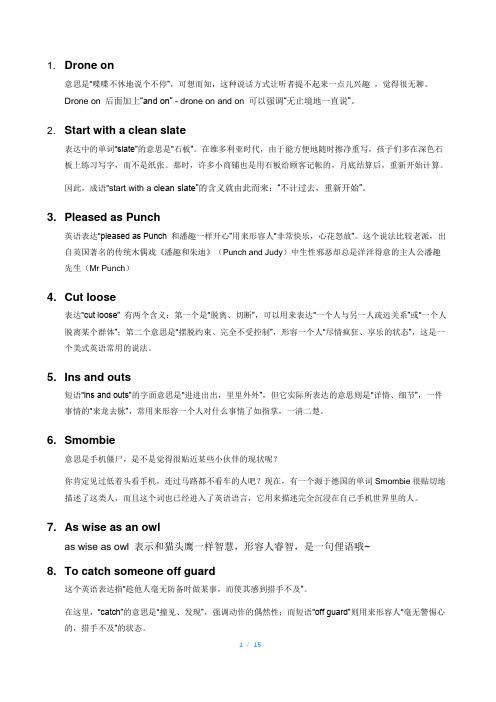
1. Drone on意思是“喋喋不休地说个不停”,可想而知,这种说话方式让听者提不起来一点儿兴趣,觉得很无聊。
Drone on 后面加上“and on” - drone on and on 可以强调“无止境地一直说”。
2. Start with a clean slate表达中的单词“slate”的意思是“石板”。
在维多利亚时代,由于能方便地随时擦净重写,孩子们多在深色石板上练习写字,而不是纸张。
那时,许多小商铺也是用石板给顾客记帐的,月底结算后,重新开始计算。
因此,成语“start with a clean slate”的含义就由此而来:“不计过去,重新开始”。
3. Pleased as Punch英语表达“pleased as Punch 和潘趣一样开心”用来形容人“非常快乐,心花怒放”。
这个说法比较老派,出自英国著名的传统木偶戏《潘趣和朱迪》(Punch and Judy)中生性邪恶却总是洋洋得意的主人公潘趣先生(Mr Punch)4. Cut loose表达“cut loose” 有两个含义:第一个是“脱离、切断”,可以用来表达“一个人与另一人疏远关系”或“一个人脱离某个群体”;第二个意思是“摆脱约束、完全不受控制”,形容一个人“尽情疯狂、享乐的状态”,这是一个美式英语常用的说法。
5. Ins and outs短语“ins and outs”的字面意思是“进进出出,里里外外”,但它实际所表达的意思则是“详情、细节”,一件事情的“来龙去脉”,常用来形容一个人对什么事情了如指掌,一清二楚。
6. Smombie意思是手机僵尸,是不是觉得很贴近某些小伙伴的现状呢?你肯定见过低着头看手机,连过马路都不看车的人吧?现在,有一个源于德国的单词Smombie很贴切地描述了这类人,而且这个词也已经进入了英语语言,它用来描述完全沉浸在自己手机世界里的人。
7. As wise as an owlas wise as owl 表示和猫头鹰一样智慧,形容人睿智,是一句俚语哦~8. To catch someone off guard这个英语表达指“趁他人毫无防备时做某事,而使其感到措手不及”。
中考英语情景交际用语知识点汇总

常见考点清单1.问候GreetingsGood morning/afternoon/evening。
早上/下午/晚上好!Hello/Hi。
您好!How are you? 你好吗?Fine, thank you,And you?很好,谢谢你呢?Very well, thank you。
我也很好谢谢。
I am fine,too 我也很好.How is …?….好吗?She is very well, thanks 她很好,谢谢.Good night 晚安。
Good bye …再见…..See you tomorrow。
明天见.See you later 待会见.Just so-so. 还行吧!Are you…? 你是…吗?Yes,I am /No, I am not 是,是我是./不,我不是。
2。
介绍IntroductionsWhat is your name?你叫什么名字?May I have your name please? 能告诉我你的名字吗?My name is…我的名字是…。
Just call me…就叫我…。
好啦。
What is your first/last name?你的姓/名是什么?My first/last name is …. 我的姓/名是…How do you spell your name ?怎么样能拼写你的名字呢?Tom .T-O-M Tom 。
T-O-M。
Who is the girl in white? 那个穿白色衣服的人是谁呢?What is your XXX’s name ? 你XXX的名字叫什么?His/Her name is…他/她的名字是…。
This is Mr/Mrs/Miss/ ……。
这是…先生、女士、小姐Nice to meet you 很高兴见到你。
Let me introduce …让我来介绍一下…。
I’d like you to meet…我想让你见…。
英语口语常用习惯用语

英语口语常用习惯用语一:与时间相关的习语1. Put the clock back[字面意思]:把钟表指针向后拨。
[实际意思] 指行为或观念跟不上时代;按陈旧的规矩办事;老脑筋。
E.g.: You must give university students more freedom. Don’t try to prevent them from falling in love before graduation. You can’t put the clock back!原来这样简单的词句,也能表达如此确切的意思!2. Work against the clock[字面意思]:与钟表的走动比赛。
[实际意思] 指的是抓紧时间工作,强调不停顿哦~E.g.: I have to work against the clock to finish my thesis before the holiday finishes. Otherwise my supervisor will not be happy with me.我们辛勤的烤鸭们还可以这样说哦:I have to work against the clock to pass the IELTS exam. 哈哈,是不是很准确的表达了烤鸭考前的心情!3. Go like clockwork[字面意思]:像钟表的机械装置一样运转。
[实际意思] 指计划、安排、工程或项目等进展顺利,强调有条不紊,没有麻烦。
它还有另一种说法:Run like clockwork.E.g.: The president is very happy that all our arrangements for the project are going like clockwork. And I am sure we can finish the project in time.如果part2的话题考到了future plan, something you saved money for这种和计划相关的话题,烤鸭们是可以把go like clockwork运用上去的,表达我们的计划按部就班,进展的非常顺利~4. After hours[字面意思]:钟点之后。
地道英语口语 不能小看的nothing短语
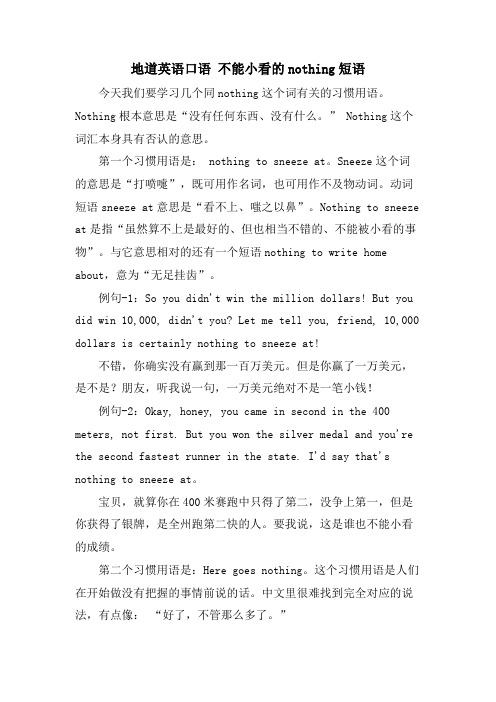
地道英语口语不能小看的nothing短语今天我们要学习几个同nothing这个词有关的习惯用语。
Nothing根本意思是“没有任何东西、没有什么。
” Nothing这个词汇本身具有否认的意思。
第一个习惯用语是: nothing to sneeze at。
Sneeze这个词的意思是“打喷嚏”,既可用作名词,也可用作不及物动词。
动词短语sneeze at意思是“看不上、嗤之以鼻”。
Nothing to sneeze at是指“虽然算不上是最好的、但也相当不错的、不能被小看的事物”。
与它意思相对的还有一个短语nothing to write home about,意为“无足挂齿”。
例句-1:So you didn't win the million dollars! But you did win 10,000, didn't you? Let me tell you, friend, 10,000 dollars is certainly nothing to sneeze at!不错,你确实没有赢到那一百万美元。
但是你赢了一万美元,是不是?朋友,听我说一句,一万美元绝对不是一笔小钱!例句-2:Okay, honey, you came in second in the 400 meters, not first. But you won the silver medal and you're the second fastest runner in the state. I'd say that's nothing to sneeze at。
宝贝,就算你在400米赛跑中只得了第二,没争上第一,但是你获得了银牌,是全州跑第二快的人。
要我说,这是谁也不能小看的成绩。
第二个习惯用语是:Here goes nothing。
这个习惯用语是人们在开始做没有把握的事情前说的话。
学英语口语,各种社交活动的英语习惯用语
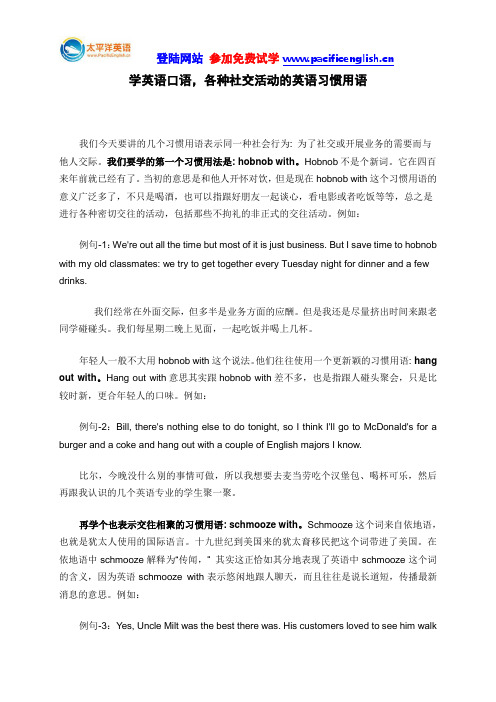
学英语口语,各种社交活动的英语习惯用语我们今天要讲的几个习惯用语表示同一种社会行为: 为了社交或开展业务的需要而与他人交际。
我们要学的第一个习惯用法是: hobnob with。
Hobnob不是个新词。
它在四百来年前就已经有了。
当初的意思是和他人开怀对饮,但是现在hobnob with这个习惯用语的意义广泛多了,不只是喝酒,也可以指跟好朋友一起谈心,看电影或者吃饭等等,总之是进行各种密切交往的活动,包括那些不拘礼的非正式的交往活动。
例如:例句-1:We're out all the time but most of it is just business. But I save time to hobnob with my old classmates: we try to get together every Tuesday night for dinner and a few drinks.我们经常在外面交际,但多半是业务方面的应酬。
但是我还是尽量挤出时间来跟老同学碰碰头。
我们每星期二晚上见面,一起吃饭并喝上几杯。
年轻人一般不大用hobnob with这个说法。
他们往往使用一个更新颖的习惯用语: hang out with。
Hang out with意思其实跟hobnob with差不多,也是指跟人碰头聚会,只是比较时新,更合年轻人的口味。
例如:例句-2:Bill, there's nothing else to do tonight, so I think I'll go to McDonald's for a burger and a coke and hang out with a couple of English majors I know.比尔,今晚没什么别的事情可做,所以我想要去麦当劳吃个汉堡包、喝杯可乐,然后再跟我认识的几个英语专业的学生聚一聚。
美国习惯用语-第357讲:用and连接两个单词
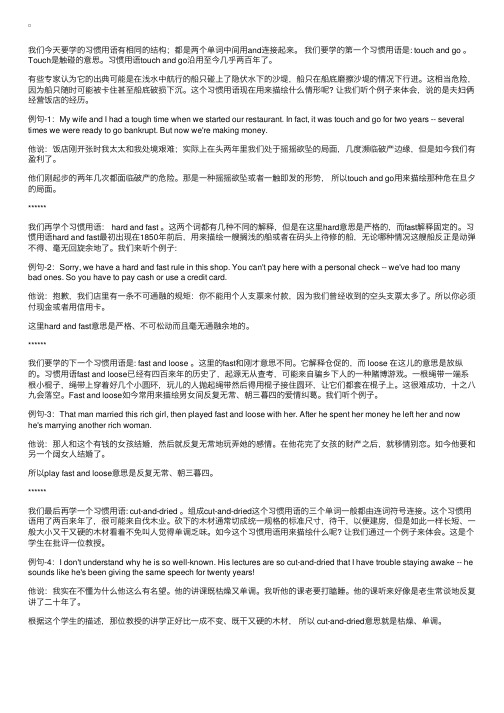
我们今天要学的习惯⽤语有相同的结构;都是两个单词中间⽤and连接起来。
我们要学的第⼀个习惯⽤语是: touch and go 。
Touch是触碰的意思。
习惯⽤语touch and go沿⽤⾄今⼏乎两百年了。
有些专家认为它的出典可能是在浅⽔中航⾏的船只碰上了隐伏⽔下的沙堤,船只在船底磨擦沙堤的情况下⾏进。
这相当危险,因为船只随时可能被卡住甚⾄船底破损下沉。
这个习惯⽤语现在⽤来描绘什么情形呢? 让我们听个例⼦来体会,说的是夫妇俩经营饭店的经历。
例句-1:My wife and I had a tough time when we started our restaurant. In fact, it was touch and go for two years -- several times we were ready to go bankrupt. But now we're making money.他说:饭店刚开张时我太太和我处境艰难;实际上在头两年⾥我们处于摇摇欲坠的局⾯,⼏度濒临破产边缘,但是如今我们有盈利了。
他们刚起步的两年⼏次都⾯临破产的危险。
那是⼀种摇摇欲坠或者⼀触即发的形势,所以touch and go⽤来描绘那种危在旦⼣的局⾯。
******我们再学个习惯⽤语: hard and fast 。
这两个词都有⼏种不同的解释,但是在这⾥hard意思是严格的,⽽fast解释固定的。
习惯⽤语hard and fast最初出现在1850年前后,⽤来描绘⼀艘搁浅的船或者在码头上待修的船,⽆论哪种情况这艘船反正是动弹不得、毫⽆回旋余地了。
我们来听个例⼦:例句-2:Sorry, we have a hard and fast rule in this shop. You can't pay here with a personal check -- we've had too many bad ones. So you have to pay cash or use a credit card.他说:抱歉,我们店⾥有⼀条不可通融的规矩:你不能⽤个⼈⽀票来付款,因为我们曾经收到的空头⽀票太多了。
八年级英语习惯用语单选题60题
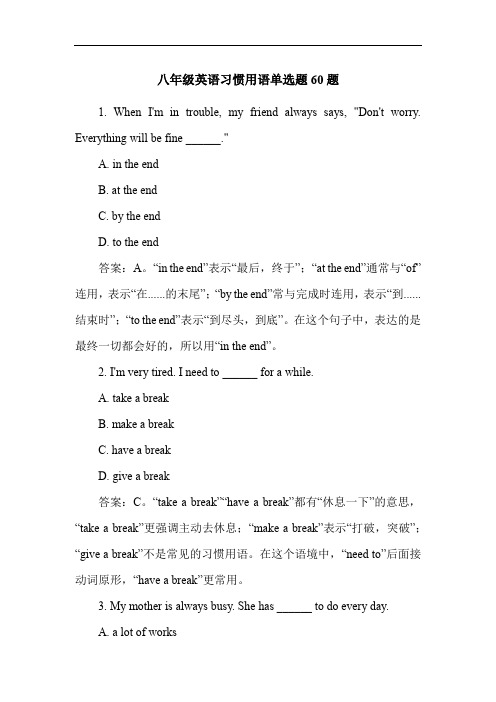
八年级英语习惯用语单选题60题1. When I'm in trouble, my friend always says, "Don't worry. Everything will be fine ______."A. in the endB. at the endC. by the endD. to the end答案:A。
“in the end”表示“最后,终于”;“at the end”通常与“of”连用,表示“在......的末尾”;“by the end”常与完成时连用,表示“到......结束时”;“to the end”表示“到尽头,到底”。
在这个句子中,表达的是最终一切都会好的,所以用“in the end”。
2. I'm very tired. I need to ______ for a while.A. take a breakB. make a breakC. have a breakD. give a break答案:C。
“take a break”“have a break”都有“休息一下”的意思,“take a break”更强调主动去休息;“make a break”表示“打破,突破”;“give a break”不是常见的习惯用语。
在这个语境中,“need to”后面接动词原形,“have a break”更常用。
3. My mother is always busy. She has ______ to do every day.A. a lot of worksB. lots of workC. many worksD. much work答案:B。
“work”作“工作”讲时是不可数名词,不能用“many”修饰,也没有复数形式,所以排除A、C 选项;“a lot of”和“lots of”都可以修饰不可数名词和可数名词复数,“much”修饰不可数名词,但是语气上“lots of”更常用,所以选B。
习惯用语英语词汇大全
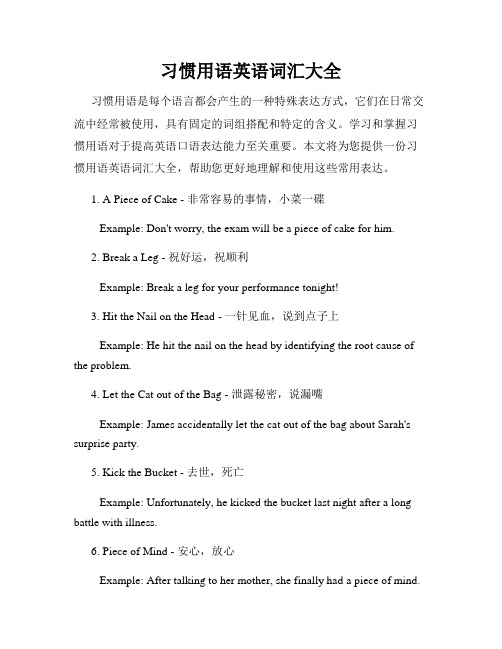
习惯用语英语词汇大全习惯用语是每个语言都会产生的一种特殊表达方式,它们在日常交流中经常被使用,具有固定的词组搭配和特定的含义。
学习和掌握习惯用语对于提高英语口语表达能力至关重要。
本文将为您提供一份习惯用语英语词汇大全,帮助您更好地理解和使用这些常用表达。
1. A Piece of Cake - 非常容易的事情,小菜一碟Example: Don't worry, the exam will be a piece of cake for him.2. Break a Leg - 祝好运,祝顺利Example: Break a leg for your performance tonight!3. Hit the Nail on the Head - 一针见血,说到点子上Example: He hit the nail on the head by identifying the root cause of the problem.4. Let the Cat out of the Bag - 泄露秘密,说漏嘴Example: James accidentally let the cat out of the bag about Sarah's surprise party.5. Kick the Bucket - 去世,死亡Example: Unfortunately, he kicked the bucket last night after a long battle with illness.6. Piece of Mind - 安心,放心Example: After talking to her mother, she finally had a piece of mind.7. Give Someone a Hand - 帮助某人,给予帮助Example: Can you give me a hand with carrying these boxes?8. Hit the Jackpot - 中大奖,得意外之财Example: She hit the jackpot and won a trip to Hawaii in the lottery.9. Cut to the Chase - 省去废话,直奔主题Example: Let's cut to the chase and discuss the main issue at hand.10. Drop the Ball - 失职,犯错误Example: The project failed because the team dropped the ball in the final stage.11. Give it a Shot - 尝试一下,试一试Example: I've never tried skydiving before, but I'm willing to give it a shot.12. Keep an Eye on - 留意,密切注意Example: Make sure to keep an eye on your belongings in crowded places.13. On the Same Page - 意见一致,达成共识Example: Let's make sure we're all on the same page before making a decision.14. Wrap it Up - 结束,收尾Example: The meeting is running late, so let's wrap it up and continue next time.15. Pull Someone's Leg - 开某人玩笑Example: He was just pulling your leg, he didn't really mean it.16. Play it by Ear - 视情况而定,随机应变Example: We don't have a fixed plan yet, so let's just play it by ear.17. In the Blink of an Eye - 一眨眼,瞬间Example: The thief stole the purse and disappeared in the blink of an eye.18. Stick to One's Guns - 坚持己见,不动摇Example: Despite the criticism, she stuck to her guns and defendedher ideas.19. Turn a Blind Eye - 熟视无睹, o o X oExample: The teacher turned a blind eye to the student's cheating during the exam.20. Keep your Chin up - 保持乐观,振作起来Example: Even though things are tough right now, keep your chin up and stay positive.这只是习惯用语英语词汇大全中的一部分,希望能为您提供一些帮助。
【重难点总结】六年级上册英语-Unit 4 Then and now 译林版(三起)
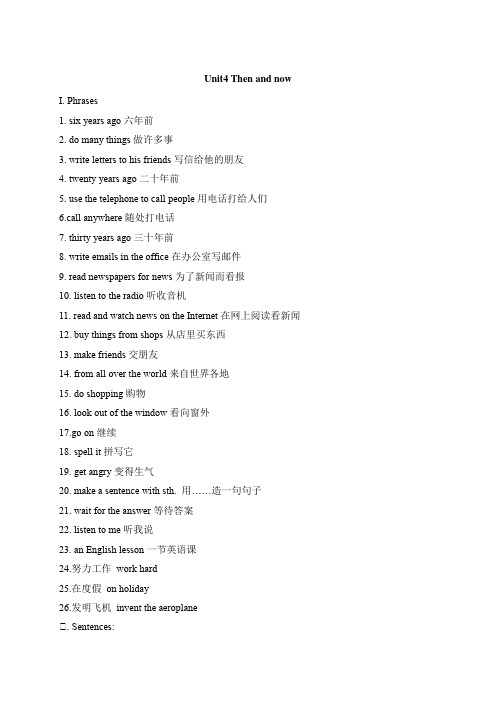
Unit4 Then and nowI. Phrases1. six years ago六年前2. do many things做许多事3. write letters to his friends写信给他的朋友4. twenty years ago二十年前5. use the telephone to call people用电话打给人们6.call anywhere随处打电话7. thirty years ago三十年前8. write emails in the office在办公室写邮件9. read newspapers for news为了新闻而看报10. listen to the radio听收音机11. read and watch news on the Internet在网上阅读看新闻12. buy things from shops从店里买东西13. make friends交朋友14. from all over the world来自世界各地15. do shopping购物16. look out of the window看向窗外17.go on继续18. spell it拼写它19. get angry变得生气20. make a sentence with sth. 用……造一句句子21. wait for the answer等待答案22. listen to me听我说23. an English lesson一节英语课24.努力工作work hard25.在度假on holiday26.发明飞机invent the aeroplaneⅡ. Sentences:1. Six years ago, Mike could read and draw, but he couldn’t write.六年前,麦克会读和画,但是他不会写2. Twenty years ago, Mr. Brown wrote letters to his friends. 二十年前,布朗先生写信给朋友们。
英语习惯用语(打印版)
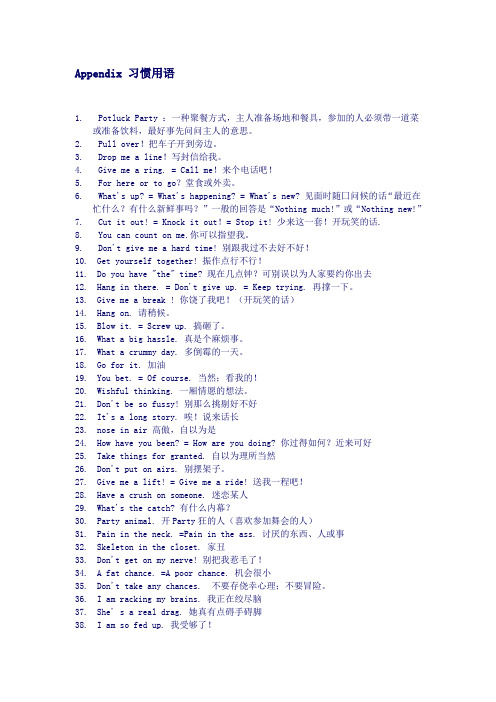
Appendix 习惯用语1.Potluck Party :一种聚餐方式,主人准备场地和餐具,参加的人必须带一道菜或准备饮料,最好事先问问主人的意思。
2.Pull over!把车子开到旁边。
3.Drop me a line!写封信给我。
4.Give me a ring. = Call me!来个电话吧!5.For here or to go?堂食或外卖。
6.What's up? = What's happening? = What's new? 见面时随囗问候的话“最近在忙什么?有什么新鲜事吗?”一般的回答是“Nothing much!”或“Nothing new!”7.Cut it out! = Knock it out!= Stop it! 少来这一套!开玩笑的话.8.You can count on me.你可以指望我。
9.Don't give me a hard time! 别跟我过不去好不好!10.Get yourself together! 振作点行不行!11.Do you have "the" time? 现在几点钟?可别误以为人家要约你出去12.Hang in there. = Don't give up. = Keep trying. 再撑一下。
13.Give me a break ! 你饶了我吧!(开玩笑的话)14.Hang on. 请稍候。
15.Blow it. = Screw up. 搞砸了。
16.What a big hassle. 真是个麻烦事。
17.What a crummy day. 多倒霉的一天。
18.Go for it. 加油19.You bet. = Of course. 当然;看我的!20.Wishful thinking. 一厢情愿的想法。
21.Don't be so fussy! 别那么挑剔好不好22.It's a long story. 唉!说来话长23.nose in air 高傲,自以为是24.How have you been? = How are you doing? 你过得如何?近来可好25.Take things for granted. 自以为理所当然26.Don't put on airs. 别摆架子。
《Then and now》基础知识PPT

使用,利用
10.telephone
电话
11.anywhere
随处,到处
12.radio
收音机
电视
14.still
仍然
15.spell
拼读,拼写
1.then and now
过去和现在
2.all over the world
全世界
3.do shopping
现在,他/她能写邮件。
1. could引导的一般过去时的否定句,在could之后加not: could not=couldn't
Six years ago, I could write.否定句: Six years ago, I couldn't write.
2.could引导的一般过去时的一般疑问句,将could调至句首:
Unit 4 Then and now
基础知识
- .
1. ago室
3.newspaper
报纸
4.news
新闻
5.watch
观看
6.e-book
电子书
7.with
用
8.yesterday
昨天
Mike could read and draw.一般疑问句: Could Mike read or draw?
3.could引导的特殊疑问句:特殊疑问词+could引导的一般疑问句?What could she do eight years ago?She could sing and dance.
购物
4.make friends
交朋友
5.read e-books
非常实用的广交会口语集锦
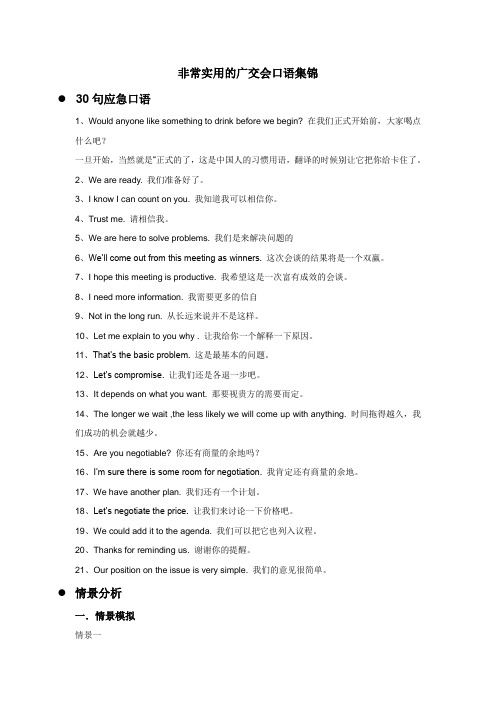
非常实用的广交会口语集锦●30句应急口语1、Would anyone like something to drink before we begin? 在我们正式开始前,大家喝点什么吧?一旦开始,当然就是“正式的了,这是中国人的习惯用语,翻译的时候别让它把你给卡住了。
2、We are ready. 我们准备好了。
3、I know I can count on you. 我知道我可以相信你。
4、Trust me. 请相信我。
5、We are here to solve problems. 我们是来解决问题的6、We’ll come out from this meeting as winners. 这次会谈的结果将是一个双赢。
7、I hope this meeting is productive. 我希望这是一次富有成效的会谈。
8、I need more information. 我需要更多的信自9、Not in the long run. 从长远来说并不是这样。
10、Let me explain to you why . 让我给你一个解释一下原因。
11、That’s the basic problem. 这是最基本的问题。
12、Let’s compromise. 让我们还是各退一步吧。
13、It depends on what you want. 那要视贵方的需要而定。
14、The longer we wait ,the less likely we will come up with anything. 时间拖得越久,我们成功的机会就越少。
15、Are you negotiable? 你还有商量的余地吗?16、I’m sure there is some room for negotiation. 我肯定还有商量的余地。
17、We have another plan. 我们还有一个计划。
18、Let’s negotiate the price. 让我们来讨论一下价格吧。
补全对话的特点及解题技巧
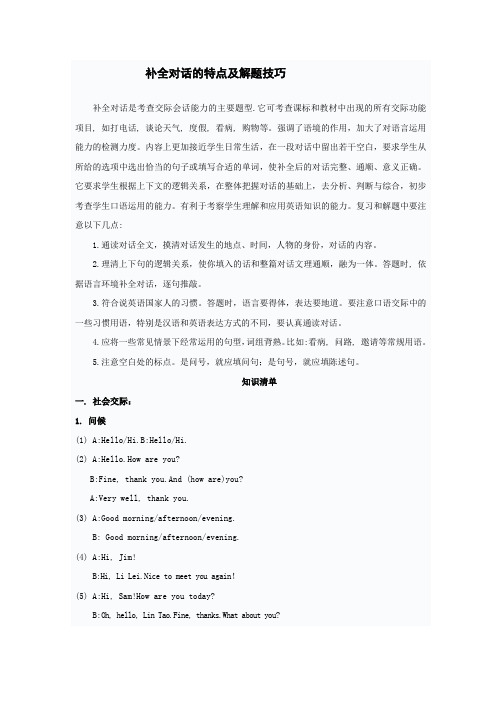
补全对话的特点及解题技巧补全对话是考查交际会话能力的主要题型.它可考查课标和教材中出现的所有交际功能项目, 如打电话, 谈论天气, 度假, 看病, 购物等。
强调了语境的作用,加大了对语言运用能力的检测力度。
内容上更加接近学生日常生活,在一段对话中留出若干空白,要求学生从所给的选项中选出恰当的句子或填写合适的单词,使补全后的对话完整、通顺、意义正确。
它要求学生根据上下文的逻辑关系,在整体把握对话的基础上,去分析、判断与综合,初步考查学生口语运用的能力。
有利于考察学生理解和应用英语知识的能力。
复习和解题中要注意以下几点:1.通读对话全文,摸清对话发生的地点、时间,人物的身份,对话的内容。
2.理清上下句的逻辑关系,使你填入的话和整篇对话文理通顺,融为一体。
答题时, 依据语言环境补全对话,逐句推敲。
3.符合说英语国家人的习惯。
答题时,语言要得体,表达要地道。
要注意口语交际中的一些习惯用语,特别是汉语和英语表达方式的不同,要认真通读对话。
4.应将一些常见情景下经常运用的句型,词组背熟。
比如:看病, 问路, 邀请等常规用语。
5.注意空白处的标点。
是问号,就应填问句;是句号,就应填陈述句。
知识清单一. 社会交际:1. 问候(1) A:Hello/Hi.B:Hello/Hi.(2) A:Hello.How are you?B:Fine, thank you.And (how are)you?A:Very well, thank you.(3) A:Good morning/afternoon/evening.B: Good morning/afternoon/evening.(4) A:Hi, Jim!B:Hi, Li Lei.Nice to meet you again!(5) A:Hi, Sam!How are you today?B:Oh, hello, Lin Tao.Fine, thanks.What about you?(5) Please say hello to your parents.Please give my best wishes to your parents.2. 介绍(1)自我介绍:①A:My name is Lin Yan.Glad to meet you.B:Nice to meet you.My name is Li Lei.②A:Excuse me.What’s your name, please?B:My name is Robert Thomas Brown.A:May I call your Robert?B:Certainly./Of course.(2)介绍他人:①A:This is Mr Huang.B:How do you do?C:My name is Lin Ping.How do you do?/Nice to meet you.②A:This is Mr.Huang.B:Nice to meet you.C:Glad to meet you.注意:在交际场合,介绍常常伴随着问候,可参见问候用语。
幼儿园日常英文用语

幼儿园日常英文用语一、早餐1.该早吃饭了。
It’s time for breakfast.2.真好吃。
Yummy!/It’s delicious.3.清洗手。
Please wash your hands.4.把手擦干。
Dry your hands.5.吃东西前请洗手。
Please wash your hands before you eat.6.打打肥皂。
Please wash your hands with soap.7.你想吃什么?What do you want/What would you like8.让我看看你们的手。
Show me your hands.9.早餐好了,请坐到桌边。
Breakfast is ready,please sit by the table.10.吃完东西漱口。
Please rinse your mouth after eating.11.不要浪费食物。
Don’t waste your food.二、点名1.我们点名吧。
Let’s call the roll.2.叫到你的名字时请答“到”。
Answer when your name is called.3.都到齐了吗?Is everyone here4.今天谁没到?Who ‘s is not here5.谁没来?Who is absent6.请喊“到”。
Please stand up and say “here”.7.我们数一下。
Let’s count.”one,two,three...”8.今天谁值日?Who’s on duty today9.你的值日做得很好。
You have done your duty very well.10.是你值日吗?Are you on duty三、早操1.向前看。
Look forward.2.原地踏步,左、右。
March in your pace,left,right.3.请看着我,跟我做。
here副词和介词用法

here副词和介词用法
“here”是一个常见的英语单词,可以用作副词和感叹词。
下面是“here”副词和介词的用法介绍:
- 用作副词:
- 这里,在这里;向这里。
如:We live here in winter. 我们冬天住在这里。
- 在这点上;这时。
如:Here the speaker paused. 这时演讲人停顿了一下。
- (用于句首,唤起对方注意某人或某物)瞧;在这里;向这里来。
如:It's ten o'clock and here is the news. 现在十点钟,新闻广播开始了。
- 用作感叹词:
- (用以引起注意等)喂!嘿!如:Here, don't cry. 得啦,别哭了。
- (点名时的回答)到!
“here”还可以用作介词,表示运动的方向、行为发生的处所、放置东西的处所等。
例如:Put them here. 把它们放在这里。
美国习惯用语英语口语
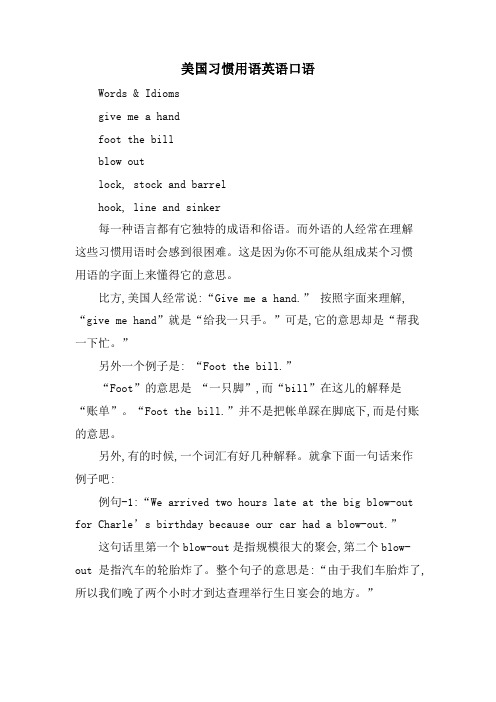
美国习惯用语英语口语Words & Idiomsgive me a handfoot the billblow outlock, stock and barrelhook, line and sinker每一种语言都有它独特的成语和俗语。
而外语的人经常在理解这些习惯用语时会感到很困难。
这是因为你不可能从组成某个习惯用语的字面上来懂得它的意思。
比方,美国人经常说:“Give me a hand.” 按照字面来理解, “give me hand”就是“给我一只手。
”可是,它的意思却是“帮我一下忙。
”另外一个例子是: “Foot the bill.”“Foot”的意思是“一只脚”,而“bill”在这儿的解释是“账单”。
“Foot the bill.”并不是把帐单踩在脚底下,而是付账的意思。
另外,有的时候,一个词汇有好几种解释。
就拿下面一句话来作例子吧:例句-1:“We arrived two hours late at the big blow-out for Charle’s birthday because our car had a blow-out.”这句话里第一个blow-out是指规模很大的聚会,第二个blow-out是指汽车的轮胎炸了。
整个句子的意思是:“由于我们车胎炸了,所以我们晚了两个小时才到达查理举行生日宴会的地方。
”还有一些习惯用语从字典上的意思来看是相同的,但是它们使用的场合却不同。
下面两个习惯用语就是很好的例子。
一个是“Lock, stock and barrel”,另外一个是:“Hook,line and sinker”。
Lock, stock and barrel和Hook, line and sinker都是全部的意思,可是用法却不同。
我们先来举一个Lock, stock and barrel的例子:例句-2:“Mr. Rockefeller bought the whole oil pany lock, stock and barrel.”这句话的意思是:“洛克菲勒先生把整个石油公司买了下来”。
